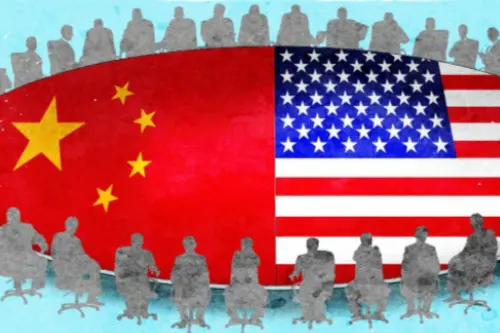Too many bureaucrats with too little power and a loss of focus have weakened the talks, analysts say
China and the United States should overhaul their annual strategic meeting to make it a more effective negotiating table, analysts from both nations say.
The China-US Strategic and Economic Dialogue – which brings together more than 100 high-ranking officials – was often hindered by bureaucracy, and the next US administration should rework its structure, they said.
The latest round concluded in Beijing yesterday, with pledges by Beijing and Washington to tackle excess steel capacity and enforce sanctions against DPRK. But the two sides remained divided over other key issues such as disputes in the South China Sea.
The dialogue was established by the administration of US President Barack Obama in 2009 – upgrading a mechanism started under his predecessor, George W. Bush. Analysts said the meetings might be phased out after the US election this year, even if Hillary Clinton – one of the architectsof the dialogue – was elected president.
“The current format of the dialogue has turned into an extremely large gathering of officials and it is not efficient to have so many ministers and deputy ministers involved at the same time,” said David Dollar, a senior fellow at the Washington-based Brookings Institution.
He said President Xi Jinping had consolidated most economic decision-making power, limiting the role of ministries. “This has resulted in a slow pace of economic reform and makes the dialogue between the US and Chinese technocrats less relevant,” he said.
Scott Kennedy, of the Centre for Strategic and International Studies, also based in Washington, said he expected the new US leader would rework the format.
“The strategic and economic dialogue has become less focused on genuinely strategic issues, and spends too much energy on quotidian issues that should be managed through the regular bureaucratic process,” Kennedy said.
Robert Manning, a senior fellow of the Brent Scowcroft Centre on International Security at the Washington-based Atlantic Council, said it was a “legitimate question” whether the summit was the best approach to manage ties.
Obama’s successor would come into office at a time of increasingly volatile Sino-US relations, Manning said. Doubts remained on whether China’s integration into the global system would push Beijing to accept international norms, and whether the country’s growing middle class would usher in political reforms, he added.
“Political trends in China that have curbed transparency, limited the flow of ideas and concentrated power at the top certainly make it difficult for bureaucrats fearful of veering from the status quo,” he said.
Zhao Minghao, an associate researcher at the China Centre for Contemporary World Studies under the Communist Party, agreed the present dialogue mechanism was not perfect.
“More than 100 high-ranking officials cannot have in-depth discussions during such a short session,” Zhao said. “Policymakers from both countries can better understand each other through more casual occasions.”
But Victor Shih, an associate professor of political science at the University of California,
San Diego, said both Clinton and the presumptive Republican nominee Donald Trump would probably continue the dialogue.
“Either candidate would want to continue the dialogue because it represents an automatic mechanism to discuss a wide range of issues,” Shih said.
He Weiwen, co-director of the China-US-EU Study Centre under the China Association of International Trade, which is part of the Ministry of Commerce, agreed.
“Such high-level dialogue will continue as this mechanism is important in contributing to the development of a new model of major country relations,” He said.
The importance of the dialogue was second only to that of meetings between the two nations’ presidents, He said. “[The dialogue] over the years has served as an important platform in managing issues such as intellectual property, Taiwan issues and South China Sea disputes.”
Tao Wenzhao, a US affairs expert at the Chinese Academy of Social Sciences, said the talks brought China and the US together, cutting bureaucratic and interministerial wrangling.
(SOUTH CHINA MORNING POST)
 简体中文
简体中文

